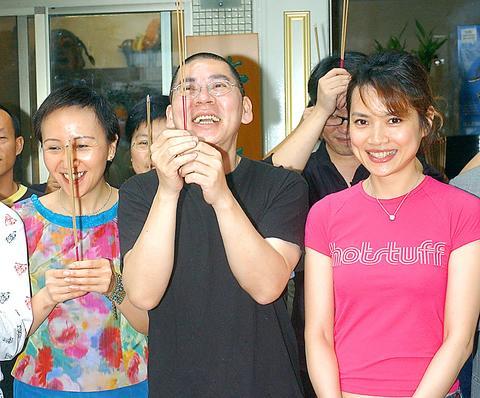So, you still think Tsai Ming-liang's (
Last week in Kaohsiung during the last few takes of shooting, Tsai's favorite actor Lee Kang-sheng (
Chen Shiang-chyi (

PHOTOS: SHEN CHAO-LIANG, TAIPEI TIMES
As for actress Lu Yi-ching (
"This is going to be a lively and bustling movie and I think it will be a breakthrough for myself in terms of a film style," Tsai said.
He is a fanatic fan of 1930s Mandarin pop songs from artists like Grace Ge (

The story of Wayward Wind, which has just finished shooting, is an extension of Tsai's 2001 feature What Time is it There? (
Chen Shiang-chyi's character meets watch vendor Lee Kang-sheng's character on a skywalk in Taipei before she leaves for Paris. A strange longing grows between the two when she is away. But when Chen returns to Taipei, the skywalk is gone and she does not know how to find Lee, who has lost his job as a vendor and has become a porn actor.
The narrative is not chronological, Tsai said. "It will not be a realistic film in terms of space and time ... In terms of acting, I also give the actors more latitude, this time."
For the actors, nudity was an issue, though Lee said, "I don't need to watch more porn films to find out more [about the life of porn stars]. I've already seen a lot of them."
Like Tsai's previous films, Wayward Wind is partly funded by investors in France. The NT$18 million budget movie is co-financed by French TV station Arte and Centre National de la Cinematographie, in cooperation with Taiwan's Subsidy For Film Production (
So, will this new film have more dialogue than Tsai's last movie, Goodbye, Dragon Inn (

Every now and then, it’s nice to just point somewhere on a map and head out with no plan. In Taiwan, where convenience reigns, food options are plentiful and people are generally friendly and helpful, this type of trip is that much easier to pull off. One day last November, a spur-of-the-moment day hike in the hills of Chiayi County turned into a surprisingly memorable experience that impressed on me once again how fortunate we all are to call this island home. The scenery I walked through that day — a mix of forest and farms reaching up into the clouds

With one week left until election day, the drama is high in the race for the Chinese Nationalist Party (KMT) chair. The race is still potentially wide open between the three frontrunners. The most accurate poll is done by Apollo Survey & Research Co (艾普羅民調公司), which was conducted a week and a half ago with two-thirds of the respondents party members, who are the only ones eligible to vote. For details on the candidates, check the Oct. 4 edition of this column, “A look at the KMT chair candidates” on page 12. The popular frontrunner was 56-year-old Cheng Li-wun (鄭麗文)

“How China Threatens to Force Taiwan Into a Total Blackout” screamed a Wall Street Journal (WSJ) headline last week, yet another of the endless clickbait examples of the energy threat via blockade that doesn’t exist. Since the headline is recycled, I will recycle the rebuttal: once industrial power demand collapses (there’s a blockade so trade is gone, remember?) “a handful of shops and factories could run for months on coal and renewables, as Ko Yun-ling (柯昀伶) and Chao Chia-wei (趙家緯) pointed out in a piece at Taiwan Insight earlier this year.” Sadly, the existence of these facts will not stop the

Oct. 13 to Oct. 19 When ordered to resign from her teaching position in June 1928 due to her husband’s anti-colonial activities, Lin Shih-hao (林氏好) refused to back down. The next day, she still showed up at Tainan Second Preschool, where she was warned that she would be fired if she didn’t comply. Lin continued to ignore the orders and was eventually let go without severance — even losing her pay for that month. Rather than despairing, she found a non-government job and even joined her husband Lu Ping-ting’s (盧丙丁) non-violent resistance and labor rights movements. When the government’s 1931 crackdown